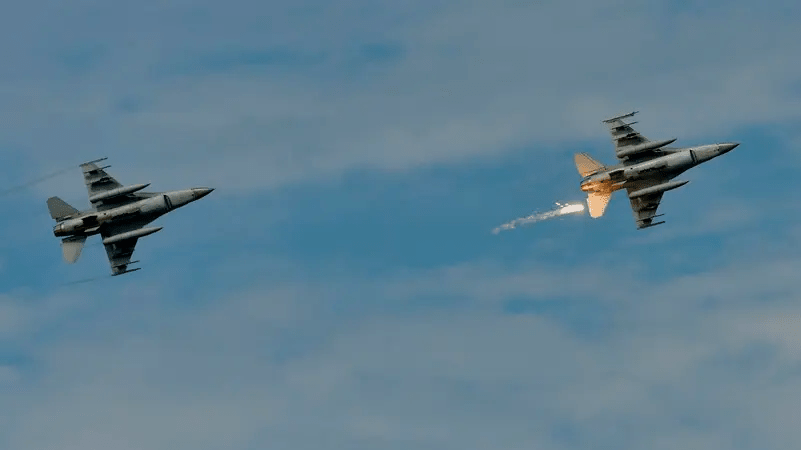More than a quarter of the Senate sent a letter to President Joe Biden on Thursday, threatening to cancel a $20 billion arms sale that includes 40 Lockheed Martin Block 70 F-16 fighter jets and upgrades to Turkey’s current fleet as long as Ankara keeps stopping Sweden and Finland from joining NATO.
The letter comes a few days after another senator on the Foreign Relations Committee said that Turkey could face sanctions if it kept making it hard for the two Nordic countries to join the alliance.
“Once Türkiye ratifies the NATO accession protocols, Congress can think about selling F16 fighter jets,” wrote Sens. Jeanne Shaheen, D-N.H., and Thom Tillis, R-N.C., in a letter to Biden that was signed by 25 senators from both parties. “However, if you don’t do that, this sale might not go through.”
Several senators on the Armed Services Committee and the Foreign Relations Committee, which is in charge of arms sales, signed the letter. Dick Durbin of Illinois, who is the second-ranking Democrat in the Senate, also signed the letter.
The senators said that Turkey is not keeping the promises it made when it signed an agreement with Finland and Sweden last year. Under that agreement, the two countries would work together to stop the illegal Kurdistan Worker’s Party (PKK) and possibly extradite some people in exchange for Turkey approving their applications to join NATO.
“Sweden and Finland have taken steps to deal with the problems in their memorandum of understanding,” I hope this will lead to ratification.”
Turkey’s President Recep Tayyip Erdogan put his sights on Sweden last month after a far-right Danish politician went there to burn a Qur’an near the Turkish embassy. The incident caused Turkey to cancel a trip by Sweden’s Defense Minister Pal Jonson to Ankara, where he had planned to talk about its bid to join NATO.
Still, the senators made sure to say that Turkey “has proven to be a valuable NATO ally as Russia’s illegal invasion of Ukraine continues.” They also praised Turkey for its “commitment to implementing the United Nations-brokered grain deal,” which has allowed Ukraine to export grain and prevented a global food crisis.
Looking to sanctions
At least two senators who are against the sale did not sign the Shaheen letter because they want to be even tougher on Turkey.
Bob Menendez, D-N.J., is the chairman of the Senate Foreign Relations Committee. He has said that he will use his position to stop the F-16 sale in Congress. He is worried about a wide range of issues, including Turkey’s jailing of journalists and political opponents and tensions with Greece in the eastern Mediterranean. Even though Menendez has said he will try to stop the F-16 sale, the State Department has not yet told Congress about it.
“The F-16 issue is about a lot more than NATO’s rise,” Menendez told Defense News last month. “It’s about a lot more than just NATO’s rise.” “But that doesn’t solve the problem by itself.”
Some of Menendez’s constituents don’t like Turkey because there are a lot of Greek-Americans and Armenian-Americans in his home state of New Jersey.
And on Tuesday, Chris Van Hollen, a Democrat on the Senate Foreign Relations Committee from Maryland, brought up the idea of punishing Turkey for not letting Sweden and Finland join NATO.
Van Hollen said at an Al-Monitor-hosted event, “We need to work together with our EU partners and think about different kinds of sanctions if Erdogan keeps blocking Finland and Sweden’s entry.”
“The Turkish economy isn’t doing too well,” he said next. “This is one of the reasons why polls in Turkey show that Erdogan is not popular. So, I do think this kind of behaviour should have some consequences.”
As required by a Russia sanctions law passed by Congress in 2017, the Trump administration punished Turkey’s military procurement agency in 2020 for buying the S-400 missile defence system. The punishments were not too harsh. The sale of the S-400 also made the U.S. pull Turkey out of its F-35 co-production programme out of fear that the powerful radar in the Russian system could be used to spy on the stealth fighter plane.
Van Hollen brought up the possibility of sanctions if Erdogan goes through with his threats to attack U.S.-backed Kurdish forces in northeastern Syria before Turkey’s presidential elections in May. This is in addition to sanctions for blocking Swedish and Finnish membership in NATO.
Van Hollen said at the Al-Monitor event, “This is an area where I think there needs to be joint U.S.-European action in the form of sanctions.” “The Europeans have always stood with the U.S. on this issue, and they still do.”
The president of the Kurdish-led government in northeast Syria, Elham Ahmad, will go to Washington next week to try to stop another Turkish invasion, especially against Kobane, a Kurdish-majority city on the border between Turkey and Syria. She has already tried to stop the F-16 sale by lobbying Congress. She pointed out that Turkey has used its own F-16 fleet to attack civilian infrastructure in northeast Syria.
Sen. Tim Kaine, D-Virginia, who signed the F-16 letter, “Turkey’s current moves into Kurdistan and northern Iraq are very troubling.”
“They and the Kurds in northern Syria have always been a problem for us, but the problems seem to be getting worse,” he said.
